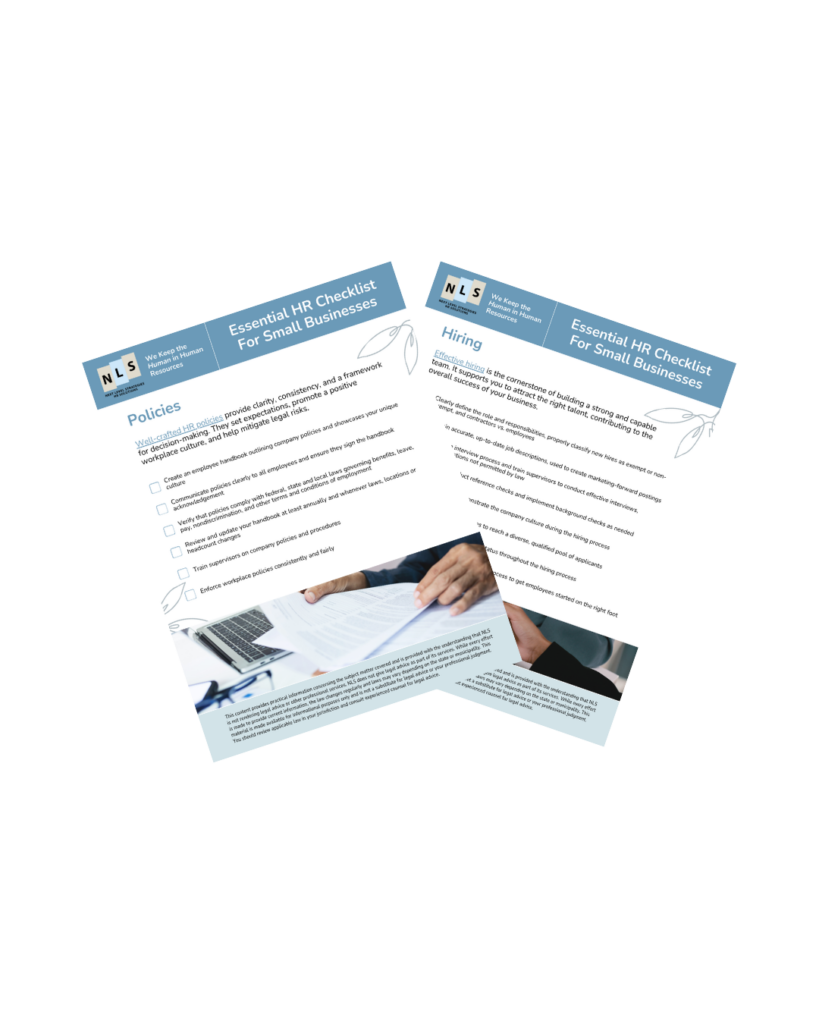
The new year is here, and 2025 is ushering in a host of new employment laws and regulations that will affect businesses across California and beyond. From wage increases to groundbreaking protections for freelance workers, these changes reflect the evolving workplace landscape we all need to keep up with. To stay compliant and proactive, employers must familiarize themselves with these updates and align their HR policies accordingly.
Let’s dive into the key laws coming into effect this new year and discuss practical steps for updating your HR policies for 2025.




Running a business is one thing—running an efficient HR function is a whole different ball game. From federal compliance to company culture, do you have what it takes to keep your HR in tip-top shape?
Take this quick quiz to test your HR knowledge for federal and California laws and see if you’re an HR superstar or if it’s time to call in the pros. Let’s go!

Effective January 1, 2025, California’s minimum wage rises to $16.50 per hour for all employers.
For exempt employees, this means the annual minimum salary also increases to $68,640. Employers must assess employee compensation to maintain compliance with these thresholds.
Under SB-1100, employers can no longer require a driver’s license as a condition of employment unless driving is essential to the job. This law aims to eliminate unnecessary employment barriers, particularly for individuals without access to a license.
For example, roles like delivery drivers or fleet operators may still require a valid driver’s license, but roles like warehouse workers cannot include this as a blanket prerequisite.
This groundbreaking legislation establishes new rules for hiring freelance workers. Employers must provide written contracts for freelance engagements, and payments must be issued within 30 days of task completion. The law includes penalties for violations, ensuring freelancers receive timely and fair treatment.
This new law doesn’t make it any easier to hire independent contractors or freelancers; the burden of the classification criteria still exists. However, if your organization has contracts with freelancers, it’s time to implement robust processes for contracts and payments.
California is encouraging small businesses to offer retirement plans by providing state-funded incentives for establishing 401(k)s. These incentives are part of broader efforts to increase access to retirement savings, complementing federal Secure 2.0 provisions. Additionally, employers with even ONE employee will be required to provide either a 401(k) plan or CalSavers to their employees before 12/31/25.
AB 2499 makes three (3) notable changes: 1. Allows leave when a family member is a victim; 2. Extends to victims of crime; and 3. Paid sick leave will be available if the individual is a victim of domestic violence, sexual assault, or stalking, and is also available if the individual is a victim of an act, conduct, or pattern of conduct that includes any of the following: (i) bodily injury or death to another; (ii) brandishing, exhibiting, or drawing a firearm or other dangerous weapon; or (iii) a perceived or actual threat to use force against another to cause physical injury or death.

Subscribe and Join Our Community Of Other Business Owners Wanting To Keep Up On The Latest HR News.

The U.S. Department of Labor has updated the overtime threshold under the Fair Labor Standards Act (FLSA). Starting January 1, 2025, salaried employees earning less than $1,128 per week (or $58,656 annually) and working outside California where the minimum amount is $68,640, must receive overtime pay.
Employers should review employee classifications to avoid costly non-compliance penalties.
Key provisions of the Secure 2.0 Act take effect in 2025:
These changes aim to boost retirement savings and simplify plan administration for businesses.
Emerging AI regulations aim to ensure fair hiring practices. Many new laws now address algorithmic bias in recruitment, requiring transparency and ethical use of AI in decision-making. Employers using AI tools should conduct audits to align with these evolving standards.

The changes in 2025 reflect a broader shift toward enhancing worker protections, fostering equity, and modernizing workplace policies. By staying informed and proactive, employers can meet compliance standards and build a more resilient and forward-thinking workplace.
If you’re unsure how to align your business practices with the latest compliance standards, we’re here to guide you. Our team offers a free consultation to help you navigate these changes and implement forward-thinking solutions that set your organization up for success. Contact us today by filling out the form below or calling 415-876-NEXT to ensure your business stays ahead with next-level compliance strategies!
Reach out to our team of HR experts today!
California has updated minimum wage rates, expanded paid leave requirements, and tightened workplace safety rules.
Yes, federal changes include higher overtime eligibility thresholds, expanded LGBTQ+ protections, and stricter reporting requirements. Multi-state employers must align these with state-specific laws.
Review state and federal updates, revise policies on wages, leave, and safety, and have the handbook reviewed by an HR expert or attorney to ensure compliance.